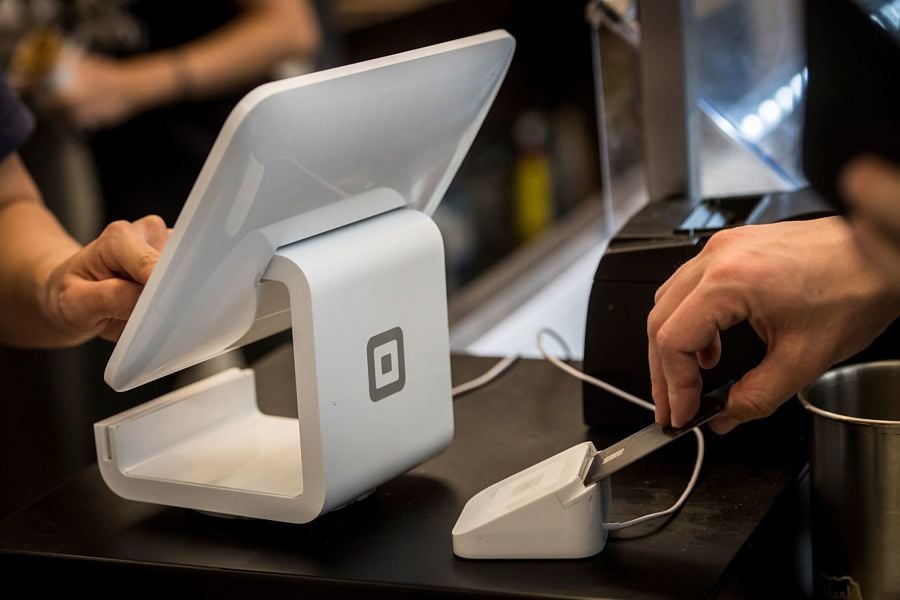

Square Inc., whose technology has already upended the way small businesses take card payments, is quietly preparing to offer checking and savings accounts to those customers, taking direct aim at behemoths such as JPMorgan Chase & Co. Square’s shares jumped on the news.
Evidence of the still-unannounced plan appeared in hidden code in a recent update to Square’s app for Apple Inc.’s iPhone and iPad. The code references both types of accounts and indicates that the checking version will integrate with Square’s existing debit card for businesses. It also suggests that Square will differentiate itself by eschewing monthly service charges and fees tied to minimum balances and overdrafts.
Square shook up the world of finance when it first debuted its card readers and offered to process payments at one easy-to-understand price -- a stark contrast to the binders with pages and pages of rates that big banks historically gave to their small-business customers looking to accept credit and debit cards.
With the checking-account offering, Square is taking even more direct aim at a business dominated by the likes of JPMorgan, Wells Fargo & Co. and Bank of America Corp. Financial institutions and their trade groups have grown increasingly vocal about Square and other financial technology companies being allowed to compete with banks without being subject to the same level of regulatory supervision.
The new business hasn’t been publicly unveiled. Steve Moser, an iOS developer, discovered the code and shared the details with Bloomberg News. The company calls the new products “Square Checking” and “Square Savings,” according to the code.
“Our bank, Square Financial Services, began operations in March,” Square said in a statement. “We’ve long said its purpose will be to offer business loan and deposit products.”
The company, which until now has focused on small-business loans, declined to comment on the new code for its app. It’s possible product details could change before launch.
Shares of Square added to earlier gains after Bloomberg News reported the plans, climbing 5.5% to $210.95 at 4:15 p.m. Monday in New York, the biggest gain since March 31.
Based on the language in the hidden code, Square is planning to offer a 0.5% interest rate for its savings account through 2021, a rate on par with other online-only savings accounts. Funds from sales processed through Square will be immediately available to spend in the checking account.
JPMorgan Chief Executive Jamie Dimon said in 2019 that his company should have been offering the types of products that transformed Square into a formidable competitor.
“What does the small business want? They wanted to process cash and checks and debit on the same machine,” Dimon said on an Investor Day conference call that year. “We didn’t give them that opportunity. Square did.”
Square Financial Services, a subsidiary of Square, was approved for a U.S. banking charter earlier this year. The years-long process required approval from both the Federal Deposit Insurance Corp. and the Utah Department of Financial Institutions.
It’s unclear when the checking and savings products will launch, but their presence in app code could indicate a release is planned in the near future. The hidden code also has links to web pages advertising the products on Square’s website that are not yet live.

Some in the industry say that more UBS financial advisors this year will be heading for the exits.

The Wall Street giant has blasted data middlemen as digital freeloaders, but tech firms and consumer advocates are pushing back.

Research reveals a 4% year-on-year increase in expenses that one in five Americans, including one-quarter of Gen Xers, say they have not planned for.

Raymond James also lured another ex-Edward Jones advisor in South Carolina, while LPL welcomed a mother-and-son team from Edward Jones and Thrivent.

MyVest and Vestmark have also unveiled strategic partnerships aimed at helping advisors and RIAs bring personalization to more clients.
Orion's Tom Wilson on delivering coordinated, high-touch service in a world where returns alone no longer set you apart.
Barely a decade old, registered index-linked annuities have quickly surged in popularity, thanks to their unique blend of protection and growth potential—an appealing option for investors looking to chart a steadier course through today's choppy market waters, says Myles Lambert, Brighthouse Financial.
